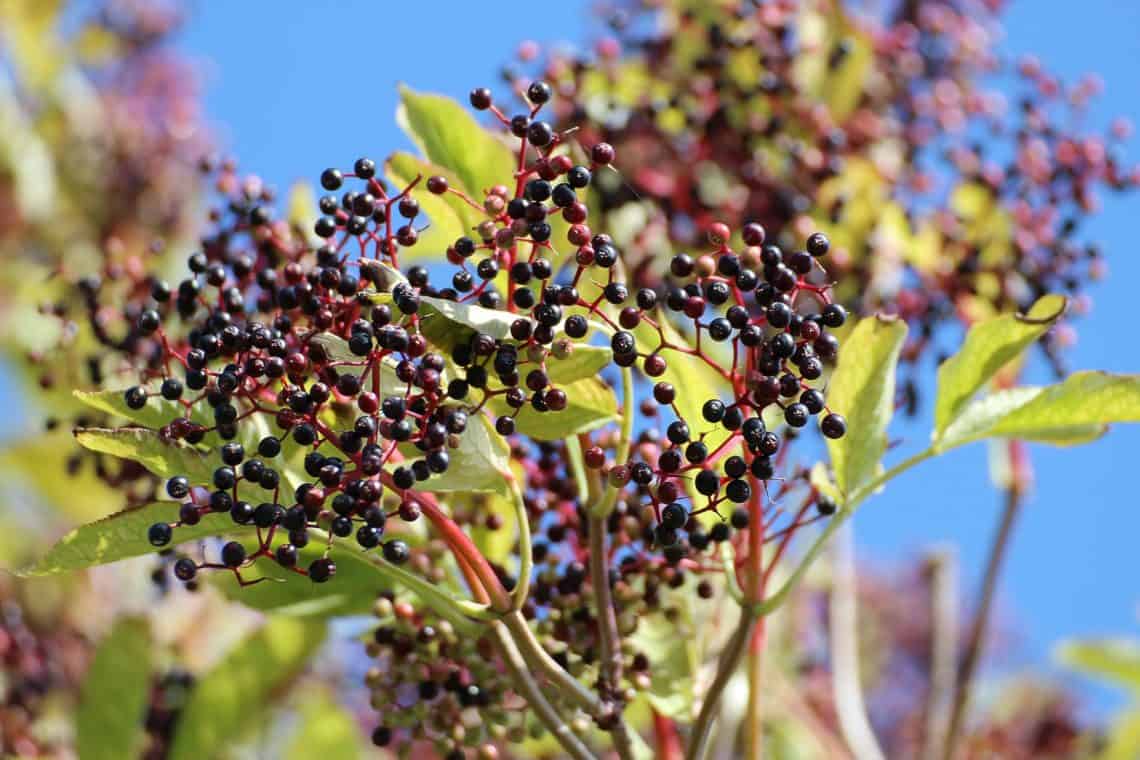This post may contain affiliate links. Read the disclosures for more information.
Elderberry (Sambucus nigra and Sambucus canadensis) is a small tree/shrub that is native to Europe and North America and it is power-packed with vitamins, minerals and immune-boosting properties. American elder can be found all along the Eastern United States, from Nova Scotia to Florida. Towards the end of summer, little white flowers bloom all over this beautiful shrub which then yield clusters of small purplish, black berries.
Benefits of Elderberry
Elderberry has traditionally been used for a variety of ailments due to its ability to treat a stomachache, sinus congestion, diarrhea, constipation, rheumatism, and the common cold (1) This tiny berry contains anthocyanins (a compound with anti-oxidant properties), vitamins A and C and it is a good source of calcium, iron and vitamin B6. Elderberry supports a healthy immune system by increasing production of inflammatory cytokines (2), which are substances that reduce inflammation and promote healing.Elderberry has been shown to have more anti-oxidant properties than blueberries along with high levels of polyphenols and flavanoids (3). The bark, leaves and raw berries are potentially toxic and should not be consumed.
Colds and Flus
The most well-known use for elderberry is as a remedy for colds and flus. Some studies report that elderberries can significantly reduce the duration of colds and flus. In one study, elderberry was found to reduce the duration of the flu by 4 days and participants who took elderberry needed significantly less rescue medication (4). Several other small studies have shown that elderberry can potentially reduce the duration of a cold or flu. In addition, there are no known contraindications to taking elderberry and there are different opinions about whether or not elderberry is safe if you are pregnant or lactating.
How to Make Elderberry Syrup
If you take a walk down the natural remedy aisle at most grocery stories, you will find many remedies containing elderberry, including lozenges and syrups. I discovered several years ago that it is quite easy to make elderberry syrup. If you prefer not to make the syrup you can find an abundance of tinctures and syrups at most stores, as well as an alcohol-free tincture that is good for children.
Homemade Elderberry Syrup
- 1/3 cup dried elderberry
- 3 cups water
- 2 tablespoons fresh ginger
- 1.5 teaspoon cinnamon
- 1 teaspoon cloves
- 1/2 teaspoon vanilla
- 3/4 cup raw honey (local is best!)
1. Put the elderberries, water, ginger, cinnamon, cloves and vanilla into a saucepan. Bring to a boil and simmer for about 45 minutes, approximately until the water has reduced by half.
2. Remove from heat. Mash the berries with a spoon and use a strainer to strain the berries and pour the liquid into a glass jar.
3. Once the liquid has mostly cooled, add the honey. (honey should never be heated too much in order to retain the medicinal properties. You can also adjust the honey according to preference.
Children can take 1/2 – 1 teaspoon and adults can take 1/2 – 1 tablespoon once a day. If you are starting to get sick, you can take this dosage every couple of hours.
Store in the fridge and use within one month. Enjoy!!!
Musical Tribute to Elderberry
If all of this information has not convinced you to try elderberry, please listen to a beautiful musical tribute to this plant by my dear friends. You will not forget all these amazing benefits after hearing this beautiful song.

